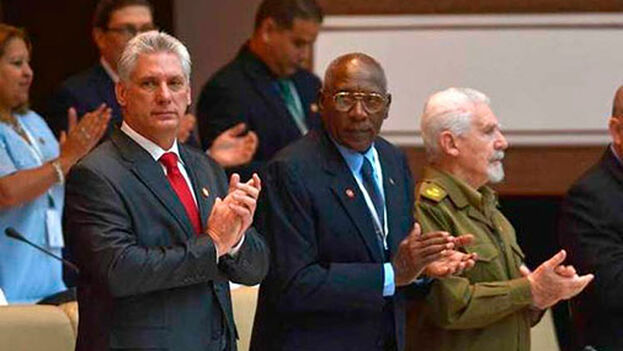
![]() 14ymedio, Yoani Sanchez, Generation Y, Havana, 12 October 2019 — The staging was studied carefully. This October 10 in Havana, every detail of the extraordinary session of the National Assembly obeyed a script rigorously written and, probably, many times rehearsed. In political dramaturgy, the election of a president of the Republic was the climax to consolidate the transfer of the helm of the national ship to a younger generation, under the tutelage of its predecessors.
14ymedio, Yoani Sanchez, Generation Y, Havana, 12 October 2019 — The staging was studied carefully. This October 10 in Havana, every detail of the extraordinary session of the National Assembly obeyed a script rigorously written and, probably, many times rehearsed. In political dramaturgy, the election of a president of the Republic was the climax to consolidate the transfer of the helm of the national ship to a younger generation, under the tutelage of its predecessors.
As in a play whose ending they knew in advance, Cuban citizens watched what happened on Thursday at the Palace of Conventions with apathy and without expectations. At the end of the day it was just a formality, a set with the deputies of Parliament as actors. With the ratification of the Constitution last February and the subsequent implementation of a new Electoral Law, the positions of President of the Republic and Prime Minister, once unified to grant full powers to Fidel Castro, were separated on the Island. This Thursday was the day to begin to split these powers and to give the president of the National Assembly the reins of the State Council.
Perhaps in an attempt to prevent a single man from changing the system from above, the ‘historical generation’ divided the decision-making between several figures who, for now, are absolutely faithful to the legacy of the bearded men who once descended from the Sierra Maestra. Calculating their approaching biological end, the now octogenarians of that distant deed fear that concentrating command in one individual is a risky bet and they have chosen to put several wolves in charge of the pack so that, as a side effect, they will keep an eye on each other.
Without surprises, continuity prevailed during the day. Miguel Díaz-Canel was elected president of the Republic, if a process in which parliamentarians can only ratify a single candidacy for each of the positions can be called an “election.” Esteban Lazo remained at the head of Parliament although all political bets had pointed to the end of his leadership in the National Assembly, while the State Council was restructured with some inclusions and some departures.
In this careful representation, officiating as master of ceremonies was former president Raúl Castro, who was the first to exercise the right to vote in a clear gesture to mark the real order of relevance and the capacity of decision-making. With the control of the Communist Party in his hands, in addition to economic power and the Armed Forces in the hands of his family clan, the veteran general prepared the script to send a public message of the system’s solidity and continuity. There was just one detail he couldn’t control: the public.
In Cuban streets, the crisis in fuel supplies, the difficulties in transport and the problems in the food supply stole the starring role. So much care preparing the set and the actors of this “electoral process” turned out to be of little use; most people took advantage of this October holiday to continue looking for the exit, to find the door that leads away from this stage, be it indifference or emigration.
_____________________
The 14ymedio team is committed to serious journalism that reflects the reality of deep Cuba. Thank you for joining us on this long road. We invite you to continue supporting us, but this time by becoming a member of 14ymedio. Together we can continue to transform journalism in Cuba.
